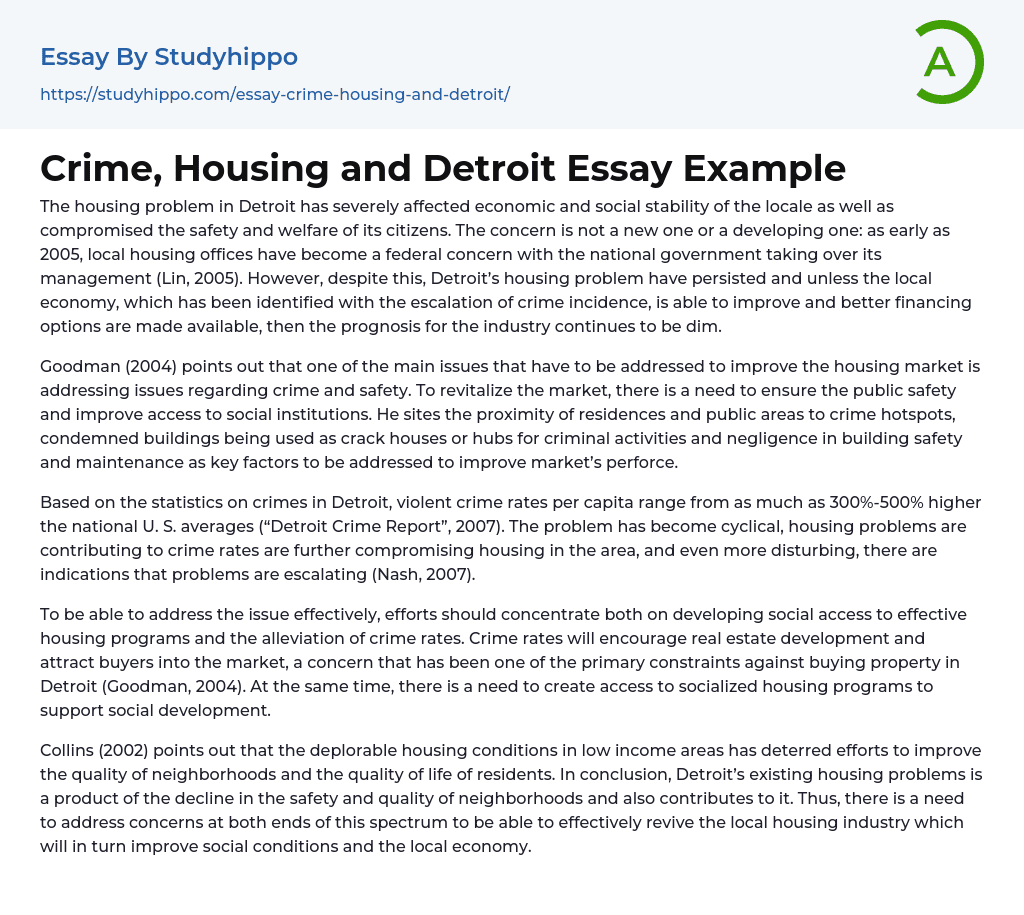The housing problem in Detroit has severely affected economic and social stability of the locale as well as compromised the safety and welfare of its citizens. The concern is not a new one or a developing one: as early as 2005, local housing offices have become a federal concern with the national government taking over its management (Lin, 2005). However, despite this, Detroit’s housing problem have persisted and unless the local economy, which has been identified with the escalation of crime incidence, is able to improve and better financing options are made available, then the prognosis for the industry continues to be dim.
Goodman (2004) points out that one of the main issues that have to be addressed to improve the housing market is addressing issues regarding crime and safety. To revitalize the market, there is a need to ensure the
...public safety and improve access to social institutions. He sites the proximity of residences and public areas to crime hotspots, condemned buildings being used as crack houses or hubs for criminal activities and negligence in building safety and maintenance as key factors to be addressed to improve market’s perforce.
Based on the statistics on crimes in Detroit, violent crime rates per capita range from as much as 300%-500% higher the national U. S. averages (“Detroit Crime Report”, 2007). The problem has become cyclical, housing problems are contributing to crime rates are further compromising housing in the area, and even more disturbing, there are indications that problems are escalating (Nash, 2007).
To be able to address the issue effectively, efforts should concentrate both on developing social access to effective housing
programs and the alleviation of crime rates. Crime rates will encourage real estate development and attract buyers into the market, a concern that has been one of the primary constraints against buying property in Detroit (Goodman, 2004). At the same time, there is a need to create access to socialized housing programs to support social development.
Collins (2002) points out that the deplorable housing conditions in low income areas has deterred efforts to improve the quality of neighborhoods and the quality of life of residents. In conclusion, Detroit’s existing housing problems is a product of the decline in the safety and quality of neighborhoods and also contributes to it. Thus, there is a need to address concerns at both ends of this spectrum to be able to effectively revive the local housing industry which will in turn improve social conditions and the local economy.
- Animal Cruelty essays
- Law Enforcement essays
- Juvenile Justice System essays
- Surveillance essays
- Forensic Science essays
- Crime Prevention essays
- Criminal Justice essays
- Criminology essays
- Drug Trafficking essays
- Juvenile Delinquency essays
- Organized Crime essays
- Penology essays
- Prison essays
- Property Crime essays
- Punishment essays
- Serial Killer essays
- Sexual Offence essays
- Victim essays
- Crime scene essays
- Punishments essays
- Charles Manson essays
- Juvenile Crime essays
- Piracy essays
- Stealing essays
- Gang essays
- Hate Crime essays
- Homicide essays
- Damages essays
- Murder essays
- Robbery essays
- Ted Bundy essays
- Prostitution essays
- Violent crime essays
- Rape essays
- Identity Theft essays
- Sexual Harassment essays
- Distracted Driving essays
- Drunk Driving essays
- Detention essays
- Sexual Assault essays
- Sexual Assault on College Campuses essays
- Cyber Crime essays
- White Collar Crime essays
- Fur essays
- Federal Bureau Of Investigation essays
- Fire Department essays
- Criminal Justice System essays
- Commitment essays
- Mass Incarceration essays
- Kill essays




